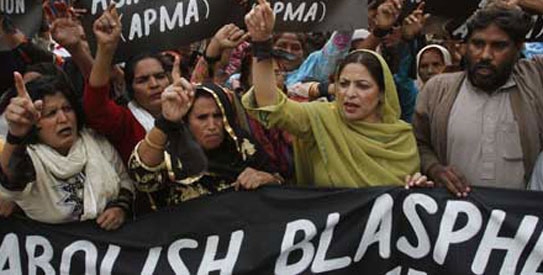| The blasphemous use of blasphemy |
 |
 |
| Monday, 20 December 2010 00:06 |
|
Another day, another arbitrarily imposed blasphemy case. Over the weekend, police arrested Naushad Valiyani, a doctor in Hyderabad, for allegedly insulting the Prophet Muhammad. Valiyani, who is Ismaili, was reportedly detained following a complaint by a medical representative, who said the doctor “threw his business card, which had his full name, Muhammad Faizan, in a dustbin during a visit to his clinic,” said regional police chief Mushtaq Shah. Shah further told the AFP, “Faizan accused Valiyani of committing blasphemy and asked police to register a case against the doctor.”
Originally published by Changing Up Pakistan According to news agencies, Shah said the issue had been resolved after Valiyani apologized for throwing away the card, but “local religious leaders intervened and pressed for action.” The police, far be it from actually thinking rationally about this whole incident, registered the case under the Blasphemy Act. And no, before you ask, they didn’t praise the doctor for not littering. This development further illustrates exactly what we’ve been discussing for months – that unless these blasphemy laws are challenged, intolerance under the guise of the law will continue to reign supreme in Pakistan. It means that every man named Muhammad (which by the way, was “the most common given name in the world” according to Columbia Encyclopedia in 2000) can cry wolf and the law will cater to the person pointing the finger rather than the falsely accused. It means that the cacophony of the mob will always ring louder than the voice of sanity. And it means that there will be many more Aasia Bibi’s and Naushad Valiyani’s to come. According to Saba Imtiaz at the Express Tribune, the Human Rights Commission of Pakistan has recorded a total of 24 blasphemy cases and convictions in 2010, and there are reportedly less cases in Sindh than in Punjab. According to HRCP director and activist IA Rehman, this is because, “Anti-Ahmadi sentiment is more prevalent in Punjab, where politics is also mixed with religion. The issue of Ahmadis in Punjab is where the blasphemy laws arose from.” Osama Siddique [head of the law faculty at LUMS] and Zahra Hayat, in an article entitled, “Unholy Speech and Holy Laws: Blasphemy Laws in Pakistan—Controversial Origins, Design Defects, and Free Speech Implications,” for the Minnesota Journal of International Law, provide an in-depth review of the blasphemy laws, going back to the legislation’s origin. They noted, …the blasphemy laws form a part of a larger pattern in which the subjugation of legislation to political expediency has subverted the processes of justice in Pakistan…the blasphemy laws…are not the product of a pluralistic and participatory democratic discourse. Instead, they are essentially the legislative interventions of a military dictator who adopted a theocratic rhetoric and agenda for clearly self-serving motivations. Therefore, the authors note, the very genesis and foundation of the laws were “highly tainted.” In fact, an interesting difference between the original sections of Chapter 15 in the Indian Penal Code and the blasphemy laws is “the elimination of any requirement of intent.” According to Siddique and Hayat, “The 1860 and 1927 versions of the Indian Penal Code greatly emphasize the intention of the accused.” In section 295, for instance, it stated, “with the intention of thereby insulting the religion of any class of persons or with the knowledge that any class of persons is likely to consider such destruction, damage or defilement as an insult to their religion.” Proving the intent of the accused (that it was deliberate and premeditated) was therefore a prerequisite in making the defendant liable for conviction. Not so in the case of the blasphemy laws, where there is no mention of the defendant’s intent. This has of course had tremendous ramifications for the law and its arbitrary application, which has been further compounded by the legislation’s lack of specificity, “making their ambit virtually limitless,” noted Siddique and Hayat. The authors also noted the deficiencies of the lower courts in Pakistan, which first take up the blasphemy-registered cases, and are “historically under-funded, under-trained, and over-burdened with work.” In fact, both the provincial and federal governments allocate less than 1% of their budgets to Pakistan’s judiciary, meaning that, all together, justice continues to be under-prioritized in Pakistan. Even if these laws aren’t completely appealed (and given how often the government caves to the religious right, their complete appeal seems unlikely in the immediate future), Siddique and Hayat note that by addressing the fundamental design and draft of these laws we can at least begin to tackle their current misuse and exploitation. The issue, as a whole, leaves me hollow. But this incredible spoken word set by Mary Kay, entitled “Hands” echoes my sentiment completely, particularly when she says: Each country sees their fists as warriors/And others as enemies/Even if fists alone are only hands…Hands are not about politics/When did it become so complicated/I always thought it simple. |
| Last Updated on Monday, 20 December 2010 11:22 |



 By Kalsoom Lakhani
By Kalsoom Lakhani
For humanity sake people WAKE UP!